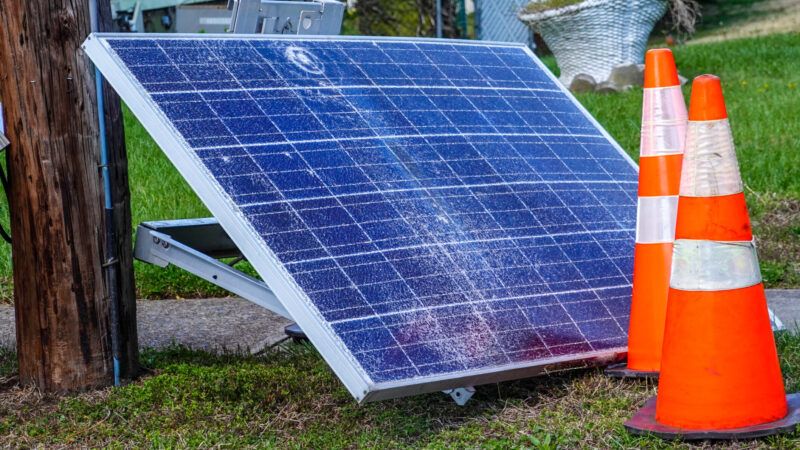Joe Biden's Solar Panel Tariffs Are a National Security Threat, Says Joe Biden
Biden should stop layering new, contradictory orders into the market and simply get government out of the way.

It's not every day that you see a president declare some of his administration's own policies to be a national security risk.
But that's exactly what President Joe Biden did on Monday, as he invoked the Defense Production Act to "accelerate domestic production" of solar panels and other clean energy projects. "Solar photovoltaic modules and module components," Biden declared on Monday, are "essential to the national defense."
"Without presidential action," Biden continued, the "United States industry cannot reasonably be expected to provide the capability for the needed industrial resource, material, or critical technology item in a timely manner."
That is to say: The president invoked executive power in an attempt to increase the supply of solar panels in America—and he did it just four months after invoking executive power to decrease the supply of solar panels in America.
Let's flash back to February. That's when a series of tariffs on solar panels (and component parts) originally imposed by the Trump administration were set to expire. Rather than letting them simply fade away, Biden re-upped the tariffs (at a rate of over 14 percent) for the next four years. He did that despite ample warnings from the solar industry about the toll that the tariffs had already extracted: a net loss of 6,000 solar manufacturing jobs and an overall loss of about 62,000 solar industry jobs as a whole, according to the Solar Energy Industries Association, a trade group.
Biden plowed ahead anyway. It was a decision that effectively prioritized domestic solar panel production over other aspects of the solar industry—like installation. Domestic producers are, in theory anyway, the beneficiaries of tariffs that make goods manufactured in other countries more expensive to import, which means people will buy fewer of them. Now that people are buying fewer solar panels, Biden has declared this to be a national emergency that requires the use of executive powers intended for wartime.
It makes absolutely zero sense. If you want a lot of solar panels installed in the United States—something the White House definitely wants, as it has set a goal of having solar energy account for half of all American energy production by 2050—then it shouldn't matter where those panels come from. A solar panel made in South Korea is just as good at providing green energy as one made in Georgia. And there's literally not enough solar panel production in the U.S. to meet rising demand.
If you're a president who wants to see more solar energy in America, that should be great news! All you have to do is nothing and let a combination of foreign and domestic suppliers help meet domestic demand.
That's why Biden's decision in February made little sense—unless you were one of the politically powerful but economically unimportant domestic solar panel producers that have been pulling the strings on U.S. solar panel trade policy for the past few years.
One of those companies, Georgia-based Suniva, told the Trump administration in 2017 that tariffs on foreign-made solar panels would spur domestic manufacturing and help create an estimated 114,000 new American jobs. Five years later, as Biden was mulling an extension to those tariffs, Suniva was once again on the front lines of lobbying for protectionism—despite seemingly having ceased to exist as a company that actually manufactures anything. As Reason has previously detailed, Suniva has gone through bankruptcy, shuttered its Atlanta facility, and hasn't updated its website since 2017.
By prioritizing solar panel producers, which account for a small minority of jobs in the industry, while increasing costs for installers and sellers, the Biden and Trump administrations have worked together to suffocate much of the solar industry.
There are real consequences to be seen. In Hawaii, for example, a solar developer pulled out of two major projects due to uncertainty about supply chains and costs—both factors that tariffs aren't helping. Meanwhile, higher costs have forced an Indiana-based electric generation company to postpone plans to use solar to partially replace a coal-fired power plant.
It's far from clear how Biden's use of the Defense Production Act will address these problems. For that matter, it's not clear how Biden's use of the Defense Production Act is even appropriate—it's a law meant to be used during wartime, not a convenient way for a president to centrally plan a sector of the economy (that he's simultaneously trying to sabotage with a different set of powers). It's also not a magic wand that a president can use to make the consequences of other policies vanish into thin air.
Like most industries that involve building things, the solar industry in America needs two conditions to grow: reliable supply chains to provide access to goods produced anywhere in the world and greater private investment. Tariffs make the former more complicated and expensive while introducing uncertainty that scares away the latter.
If Biden wants to "accelerate domestic production," he should stop layering new, contradictory orders into the market and simply get government out of the way.


Show Comments (65)